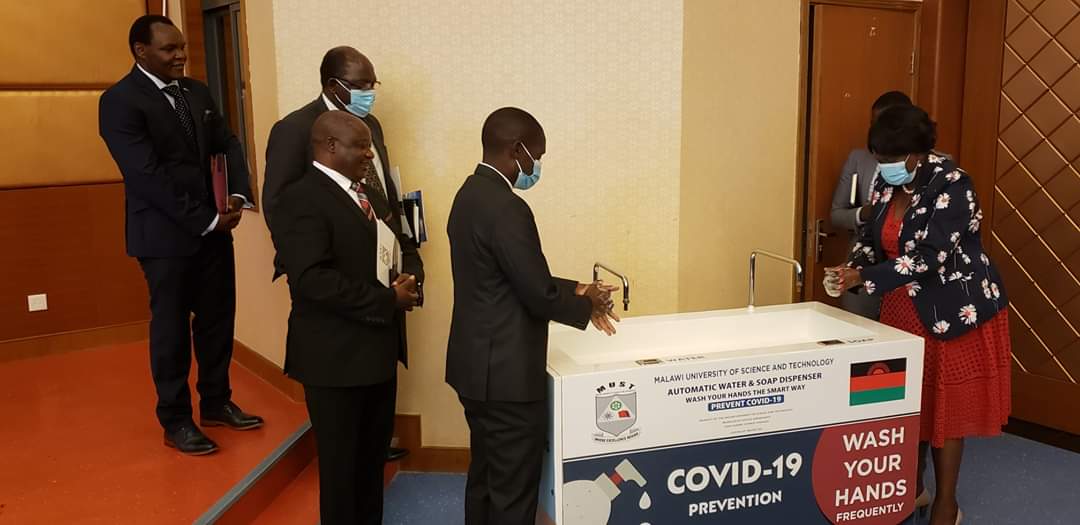Secretary for Health Dr Dan Namarika on Tuesday visited the Malawi University of Science and Technology (MUST) to appreciate its innovation efforts in the fight against Covid19
In his remarks, Dr Namarika said universities should be a source of solutions in this time of the Covid19 pandemic and asked the university to showcase innovations that have been developed and finalized and can be used; those that are still under development but have gaps so his ministry can see how best to support and those that are at concept level and need support to implement.
In response, MUST Vice Chancellor Professor Address Malata said the university learnt about the challenges that come with Covid19 earlier on through its two staff members who are doing further studies in Wuhan, the city where the pandemic started in China.
“As such, we realized that we needed to start preparing so that when the disease reaches Malawi, we should have something to fight it with. As we speak, we have various innovations at various stages of development,” she said.

In line with the Health PS’s plea that innovations should mostly focus on prevention as that is where Malawi’s health systems are stronger, MUST showcased innovations that support prevention and provision of personal protective equipment (PPEs).
The first was the automatic water and soap dispenser which has been transformed from the initial prototype is now ready for use. And to show this, the university donated the first automatic water and soap dispenser to the ministry.
Other innovations included reusable face masks that are printed in 3D, face shields of different designs and costs. Some of these, the university will only come up with designs and engage industrial partners to mass produce.
“For the face shields, we have produces more than 1000 already but the ones that require 3D printing are slow to produce because the printers we are using are not heavy duty. If we can get funding to purchase a heavy duty 3D printer, we can increase production and be able to supply across the country,” said Richard Chilipa, a lecturer and one of those involved in the project.
The university also indicated that it is developing a low cost ventilator that would go at only US$350. It is also developing disinfectors for both people and PPEs.
The university is also producing alcohol based hand sanitizers but it was also exploring production of non-alcohol based hand sanitizers, which will require certification from regulators.
“We also have developed a disposable gown that can be used as PPE by health personnel. This is also low cost and we can produce large quantities if we were to get the orders,” said Kent Kafatia, who is working on the gown.
Some of the university’s students also showcased a mobile application they have developed that is able to trace contacts of patients and suspects, self-test by focusing on symptoms and one’s network of exposure, geo-fencing of patients and people on self-quarantine in addition to providing general information on Covid19. However, this application can only be accessed or utilized on smart phones.
The students have also developed a WhatsApp bot that is able to respond to most questions around Covid19 thereby providing reliable and verifiable information to the public. The bot also incorporates aspects of self-testing.
“Both these mobile facilities are ready except for the information on Covid19 which we would like to request the Ministry of Health to provide to us so that we can share. We want to have a credible source of our information. Another area of support is on making the Apps run on toll-free connectivity. We will also need to register the innovations, especially the WhatsApp bot,” said Madalitso Nyemba, one of the students developing the Apps.
The Secretary of Health was also briefed on what MUST is doing on treatment and other areas of the Covid19 fight.
“We were interested in opening a testing centre and we talked to various partners to understand what it would take in terms of equipment and skills. We are happy to report that one partner in America has donated to us equipment that will be able to run tests with huge capacity and the equipment will be ready for dispatch in a week’s time. However, our challenge is to have the equipment transported from Boston, USA, to America, especially now when flights have been grounded.
“We would appreciate if the Ministry, through its various partners, can help by transporting our equipment together with any humanitarian supplies that would be coming from America so that we can join the fight through testing,” said Dr Gama Bandawe, Head of Biological Sciences Department which will be doing the tests.
As an education institution, the university has also come up with an e-learning platform that can be used to deliver lessons to students during this time when students are not in school.
After the presentations, Dr Namarika and his team that comprised, among others, Director of Planning Kettie Langwe and Deputy Director of Clinical Services Dr Nedson Fosiko, was taken to appreciate work in the MUST design studio where the face masks and face shields are being produced and the laboratories where tests will be done.
At the end of the day, some of the innovators have been linked to some technocrats at Ministry of Health to continue with discussions on how best the two can work together in the fight against Covid19.
As of April 28, Malawi had registered 36 cases with three deaths.



